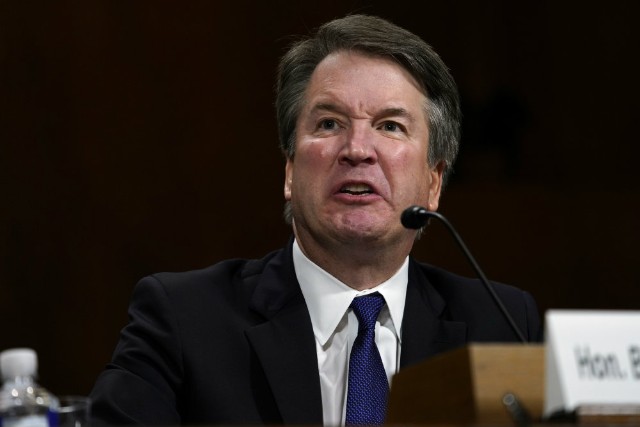More Than 1000 Law Professors Urging The Senate Not Confirm Kavanaugh

Judge Brett M. Kavanaugh testifies in front of the Senate Judiciary committee regarding sexual assault allegations at the Dirksen Senate Office Building on Capitol Hill in Washington DC, U.S., September 27, 2018. (REUTERS/File Photo)
WASHINGTON, Oct. 4
The New York Times have published names of hundreds of U.S. law professors that have already signed an online letter addressed to the U.S. Senate claiming that President Donald Trump’s Supreme Court nominee Brett Kavanaugh is disqualified from sitting on the nation’s highest court.
According to the Huffington Post, the law professors are from nearly 100 law schools around the nation. So far, the list of law professors have reached over 1000 and counting. The law professors argued that Kavanaugh ‘Lack Of Judicial Temperament’. They noted the letter will be presented to the U.S. Senate on Thursday, October 4, 2018, at 12:00 noon ET.Open Letter to the United States Senate from Law Professors Around the Country “Judicial temperament is one of the most important qualities of a judge. As the Congressional Research Service explains, to be a judge requires that an individual have “a personality that is evenhanded, unbiased, impartial, courteous yet firm, and dedicated to a process, not a result.” [1] The concern for judicial temperament dates back to our founding; in Federalist Paper 78, entitled “Judges as Guardians of the Constitution,” Alexander Hamilton expressed the need for “the integrity and moderation of the judiciary.”We are law professors who teach, research, and write about the judicial institutions of this country. Many of us appear in state and federal court, and our work means that we will continue to do so, including before the United States Supreme Court. We regret that we feel compelled to write to you to provide our views that at the Senate hearings on Thursday, September 27, 2018, the Honorable Brett Kavanaugh displayed a lack of judicial temperament that would be disqualifying for any court, and certainly for elevation to the highest court of this land.
The question at issue was of course painful for anyone. But Judge Kavanaugh exhibited a lack of commitment to judicious inquiry. Instead of being open to the necessary search for accuracy, Judge Kavanaugh was repeatedly aggressive with questioners. Even in his prepared remarks, Judge Kavanaugh located the hearing as a partisan question, referring to it as “a calculated and orchestrated political hit,” rather than acknowledging the need for the Senate, faced with new information, to try to understand what had transpired. Instead of trying to sort out with reason and care the allegations that were raised, Judge Kavanaugh responded in an intemperate, inflammatory, and partial manner, as he interrupted and, at times, was discourteous to questioners.
As you know, under two statutes governing bias and recusal, judges must step aside if they are at risk of being perceived as or of being unfair. See 28 U.S.C. §§ 144, 455. As this Congress has put it, a judge or justice “shall disqualify himself in any proceeding in which his impartiality might reasonably be questioned.” 28 USC § 455. These statutes are part of a myriad of legal commitments to the impartiality of the judiciary, which is the cornerstone of the courts.
We have differing views about the other qualifications of Judge Kavanaugh. But we are united, as professors of law and scholars of judicial institutions, in believing that Judge Kavanaugh did not display the impartiality and judicial temperament requisite to sit on the highest court of our land”.
Earlier this week, the Harvard Law School informed the students that Kavanaugh will not teach his course as scheduled next semester. The judge has taught “The Supreme Court Since 2005” course at Harvard Law School since 2009.
Three women came forward last month to accuse Kavanaugh of sexual harassment or assault during his high school and college years. Trump on Friday ordered a one-week probe by the Federal Bureau of Investigation (FBI) into the allegations.
